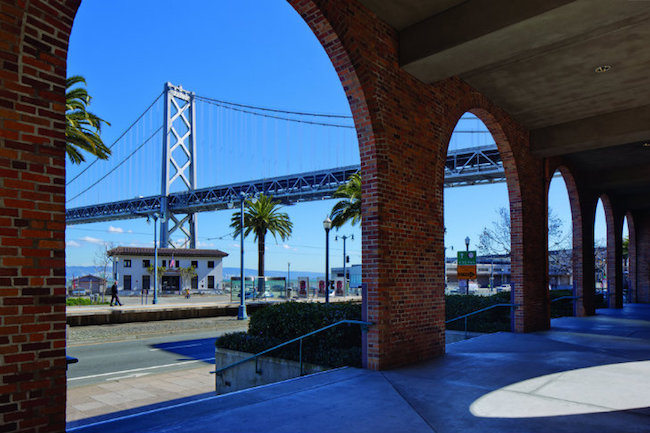“We already had a campus out there, so that took care of some of the challenges other schools might have in setting up a similar program,” Santopietro said.
Students in the Babson program take two liberal arts courses and two entrepreneurship classes while in the program, most of which are taught by the school’s Wellesley faculty via video streaming, though a handful of faculty fly out once or twice a month to teach in person, Santopietro said. Students do numerous treks to companies in the Bay area, attend pitch events where they watch entrepreneurs present ideas to venture capitalists and are encouraged to make coffee and lunch dates with people that could be valuable future contacts, she said.
A BABSON FIELD CLASS WITH A SMALL STARTUP OR TECH COMPANY
One of Babson’s two entrepreneurship classes is a consulting field class, where students work with a client, usually a small startup or technology company, to help solve a business problem. In the other entrepreneurship class, Silicon Tech Ventures, students come up with a business idea, form teams and pitch the concept to venture capitalists at the end of the semester.
Benji Cohen, a junior at Babson currently in the Semester in San Francisco program, is using that class to hone his own technology startup, a real estate outsourcing company that allows local consumers to share their opinion with landlords on what stores they’d like to see occupy vacant retail stores. Two weeks ago, he and his team flew out to St. Louis, Mo., to test out the concept with local consumers in a shopping center. He’s also received advice from the founder and CEO of Storefront, a startup that runs an online marketplace for short-term retail space, and is getting ready to pitch the idea to investors at the end of the semester.
“What better way to approach a tech startup than by immersing myself in the San Francisco scene,” he said. “It’s one of the best things that happened to me that I got accepted.”
MIAMI UNIVERSITY BOASTS A FULL INNOVATION SEMESTER IN SAN FRANCISCO
Perhaps the most established undergraduate semester-away program for undergraduates in the Bay Area is Miami University’s San Francisco Digital Innovation Semester, which has been run by the Oxford, Ohio-based school for the last five-and-a-half years. Glenn Platt, a professor of marketing and interactive media studies, is the director of the interdisciplinary program, which attracts students majoring in business, engineering and computing and interactive media studies, amongst other majors.
Back when the school was thinking of starting a semester program in Silicon Valley, Platt canvased the Bay Area and quickly realized that there wasn’t any substantial undergraduate semester-long program that exposed students to the area’s rich startup culture, and those that did were just a few weeks at the most.
“There were some graduate business programs out there, but not really a whole lot of undergraduate presence,” he said. “Our approach was to build a program that completed immersed students in the startup culture and the digital innovations taking place in San Francisco and the Bay Area. ”
The competitive for-credit program has about 20 students a semester, and accepts only about one-half to one-quarter of students who apply. Students do what he calls intensive “apprenticeships” four days a week at startups, and take an online entrepreneurship class. In the evenings they are required to go to networking events and meetups, and they spend every Friday touring the Bay area, visiting large companies like Google and Twitter, small startups and venture capital firms. The university does not have a campus, but meetings are held in board and training rooms at various companies in San Francisco where alums work.
Without fail, students in the program get job offers every semester, Platt said. One junior who participated in the program a few years ago did an internship at Uber and was offered a job after the semester was over (the student took it and completed his senior year at Miami University online), Platt said.
DEAN WANTS TO SEE PROGRAM GROW TO 150 STUDENTS A YEAR
The program has been so successful that the university’s business school dean would like to see it grow to 150 students eventually, he said. In the meantime, other schools have been eager to learn more about the program, and Miami University recently opened the program up to students from the University of Michigan and Bentley University. Several other schools are hoping to partner with them next year, he said.
As a pioneer in the space, Platt said he is familiar with the many hurdles that come with setting up a successful program for undergraduates in Silicon Valley, which is why so few schools have set up shop so far. Challenges range from finding affordable housing to students, transporting them around a city with limited public transportation and convincing faculty, particularly those that teach business, that a program like this is worthwhile enough to take students away from the campus classroom.
“Business school education, to a large extent, is still far too traditional to figure out how to do this. Most don’t have curriculums that are flexible enough where you can take the semester off and still graduate in four years,” he said. “That is a big hurdle, which is why partnering with other schools is a good idea. It is a quick way for everyone to get up to the learning curve quickly.”












Questions about this article? Email us or leave a comment below.